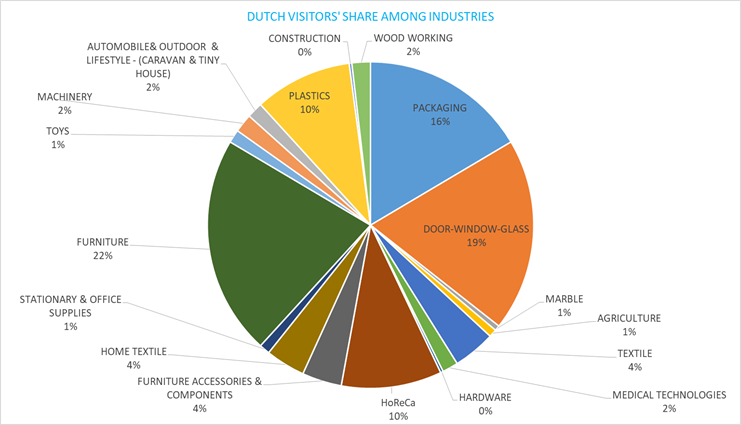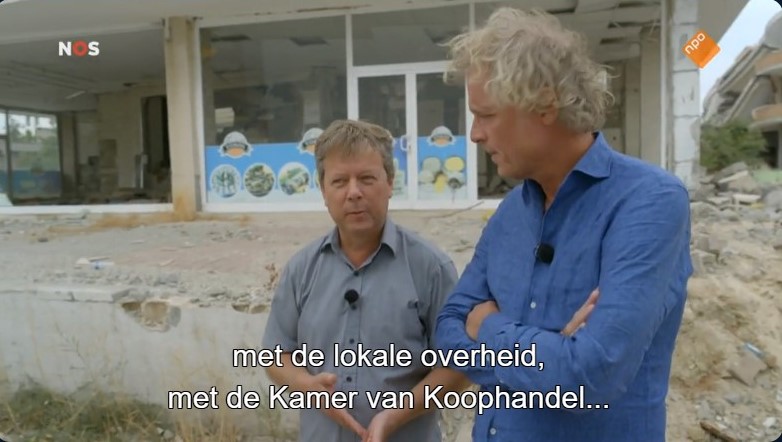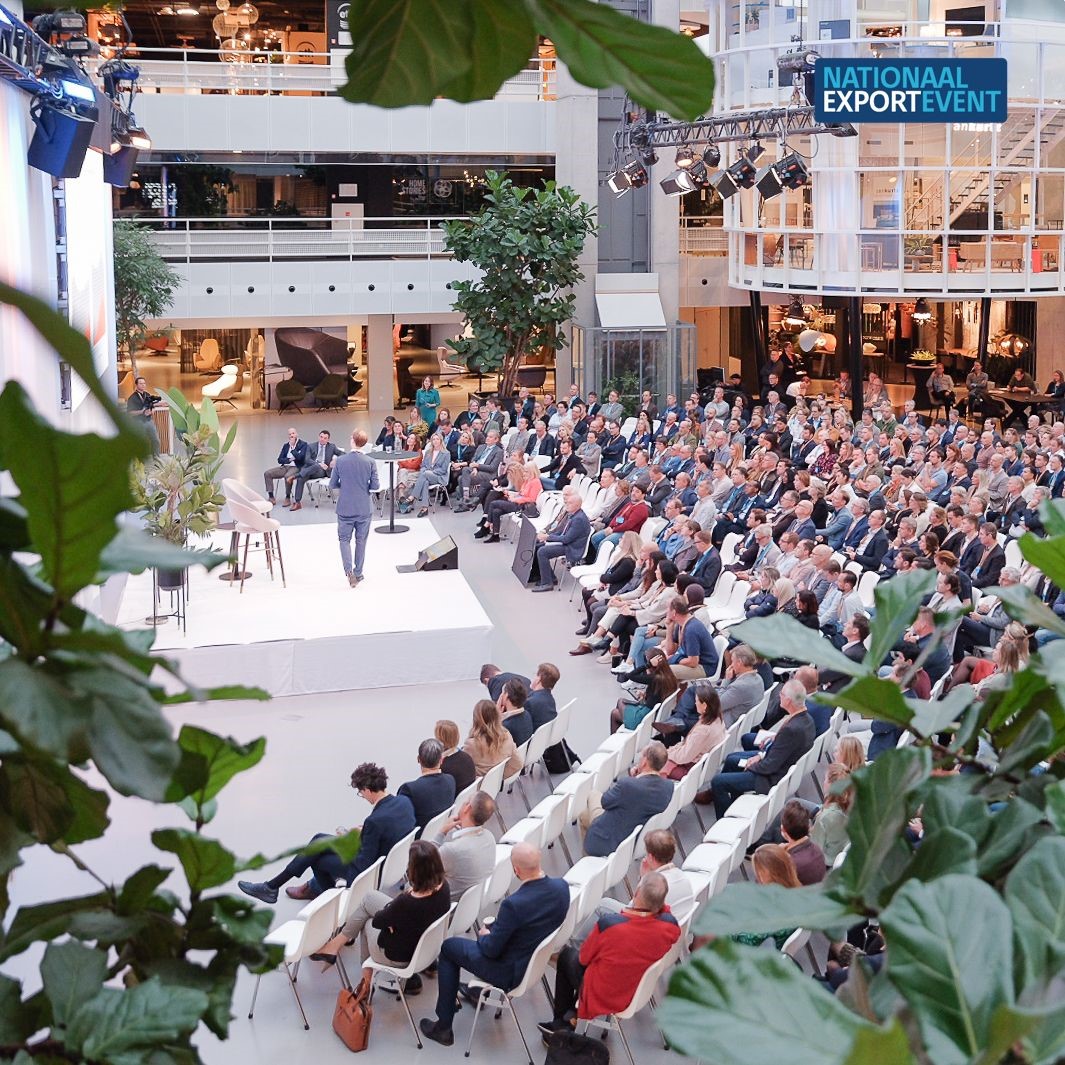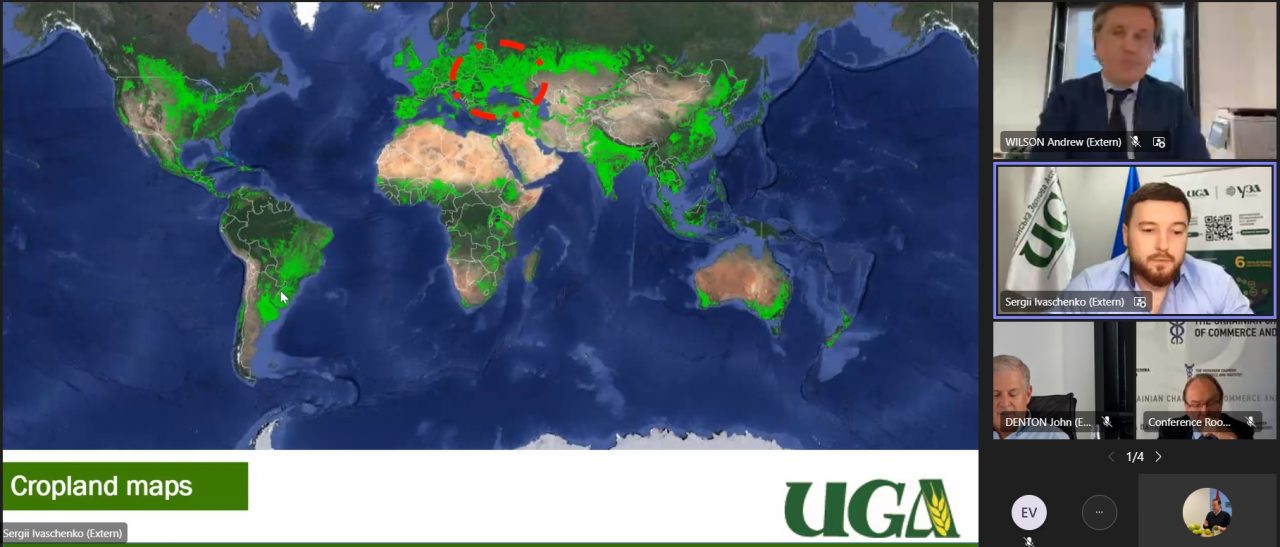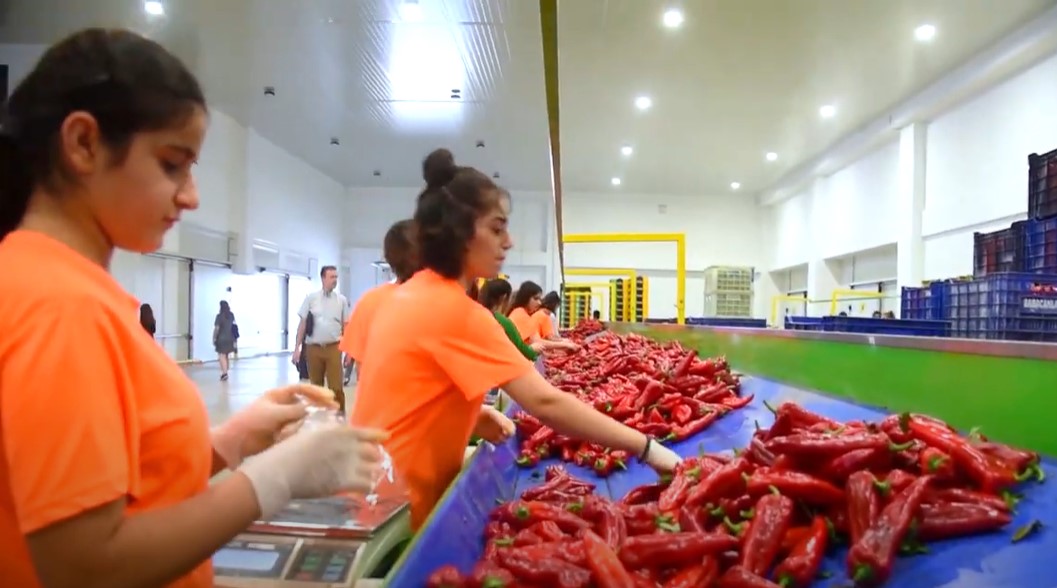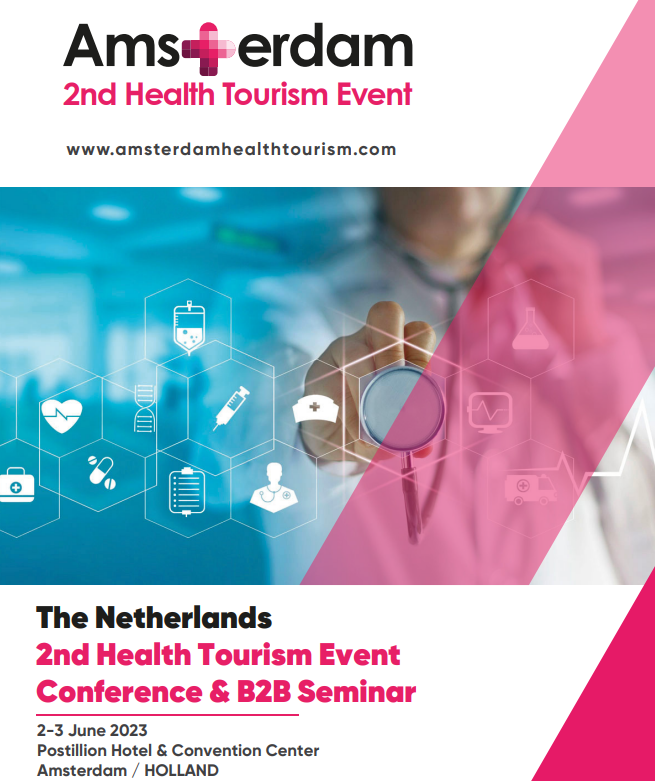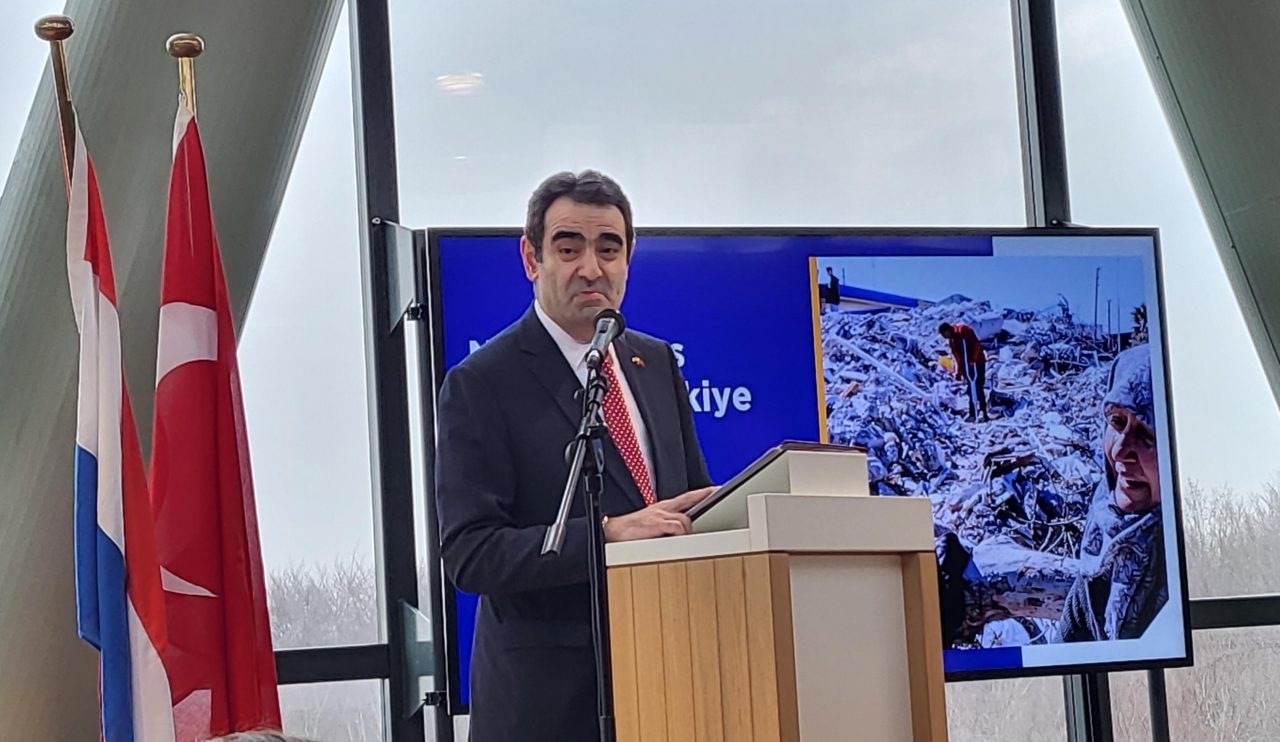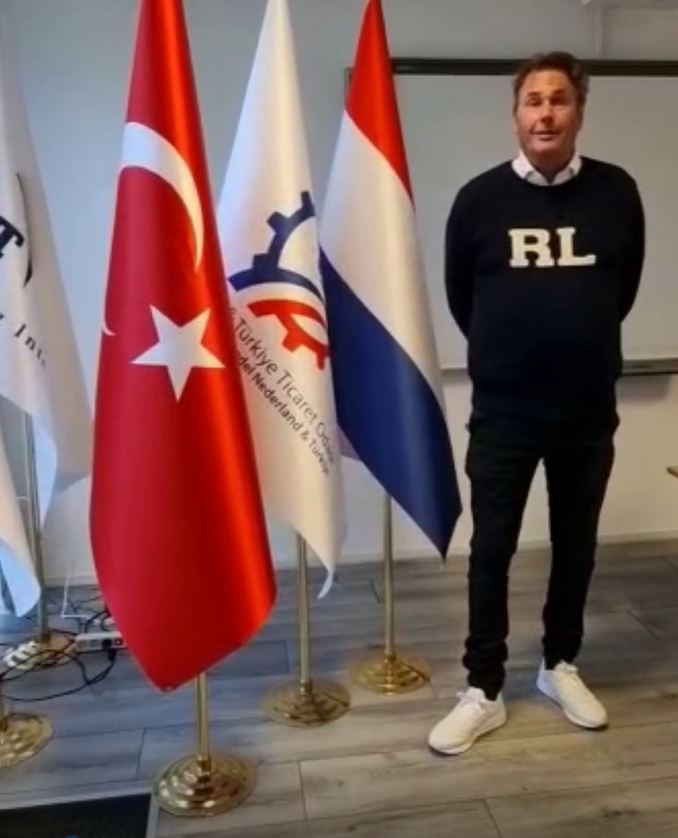-
Jul 10 2024 Sweet start of inspiring EU presentation
The smell of spices filled the conference room in Rotterdam. A Turkish delegation from the Chamber of Commerce and Industry of the Manisa region brought a delicacy ‘Manisa Mesir Macunu’ as a tasty introduction to an important topic: the Green Deal and its consequences for European and Turkish companies.
Spicy snack for Dutch supermarket?
Macun, a traditional Turkish firm toffee chewing paste made from honey or grape molasses, mixed with various herbs and nuts, offers a tasty change from the everyday sweet, salty and bitter that can be found in Dutch stores. This snack is flavored with cinnamon, cloves, nutmeg and sometimes herbs such as mint or thyme.
Raisins were also shown mixed with wafer-thin orange peels. A creative and smart way to add an extra flavor ‘twist’ to an ancient product, the raisin. Interested Dutch producers and importers can contact the foundation in Rotterdam to discover these types of trends and other opportunities in Turkiye.

Manisa toffee Avoid CO2 tax
The European Green Deal and the mandatory bureaucratic processing and implementation of these rules were next on the agenda. The Holland Trade Center Istanbul was invited to give a presentation on this subject. Representatives of the Chambers of Commerce and municipalities of the twin cities of Valencia from Spain, Manisa and other municipalities from Turkiye were present.
“The Green Deal sets strict requirements for CO2 emissions,” said the spokesperson for the Holland Trade Center Istanbul. “Companies that do not meet these requirements risk high CO2 taxes on their products. This could significantly harm their competitive position.”
Maintain competitive position through training
It quickly became clear that sharing knowledge, practical guidance and training on how to implement the Green Deal rules is of great importance. “We are ready to support Turkish companies in this transition,” continued the Dutch expert. “It is crucial that they take the right steps to make their production processes more sustainable. Only in this way can they maintain and even expand their market share in Europe.”
In general, it can be said that Turkish Chambers of Commerce are preparing for the Green Deal with ‘Europe’ sessions and training. However, it is typical for Turkiye that these are often facilitated by (technical) engineers or (general) consultants.

Delegation Manisa Chamber of Commerce & Industry and partners This is precisely what sets the Holland Trade Center Istanbul apart. The training courses are given by entrepreneurs who have already implemented the Green Deal implications with their clients. They specialize in international product, program and project management and have years of practical knowledge in, among others, the food, energy and IT sector.
Personal matchmaking
The presentation ended constructively with the distribution of contact details. A question that the foundation often receives from interested Dutch entrepreneurs is “What kind of Turkish participants can we expect when we visit you? Here is a screenshot of the above-mentioned delegation:

The visit ended with a mix of business insights, culinary discoveries and the typical Turkish ceremonial courtesy.

Interested parties can make a personal appointment at info@hollandtradecenteristanbul.com
-
May 17 2024 European Green Deal Event – Turkiye
On May 8, a high-level event was held at Sakarya University in Turkiye, dedicated to the implications of the European Green Deal regulations for Turkiye. Speakers from Turkish ministries and European bilateral chambers of commerce gathered managers, academics, and policymakers to discuss the challenges and opportunities presented by the Green Deal.
Exporters and professional associations shared their opinions with the assembled audience. Leyla De Mos, an international trade expert with experience in both Dutch and Turkish enterprises, was invited as a speaker. Her expertise in trade and sustainability, combined with her extensive relationships with small and medium-sized producers across various sectors, made her the ideal speaker.
Participants included representatives from the Accounting and Auditing Oversight Board, various ministries such as Trade and Environment, and top executives from prominent industries like PIRELLI and FIAT.

Among the invited panel speakers from the bilateral chambers of commerce was the Netherlands-Turkiye Chamber of Commerce Foundation. Presentation by Leyla De Mos:
– Actions on waste challenges
– Corporate Sustainability Due Diligence
– Digital Passport for textiles
– Ecodesign for Sustainable Products Regulation
– Sustainable Products RegulationLeyla emphasized that 80% of the ecological footprint of a textile product is determined in the design phase, which is why the EU imposes more responsibilities on textile producers. She highlighted the financial benefits of sustainability, using the example of the existing (old) Ecodesign Directive from 2009, which has proven beneficial for business, consumers, and the environment. In 2021, it saved €120 billion in energy costs and reduced consumer energy bills by 10%, covering 31 types of products. The EU also weighs the cost of each measure against the affordability of textiles.
Leyla discussed the importance of the Digital Product Passport, which should contain transparent information about products, enabling informed decisions for repairs and recycling, especially in the construction sector. Peter Wolters, vice-chairman of the Netherlands-Turkiye Chamber of Commerce Foundation, had warned about this development in an article in Istanbul Today magazine already in 2020.
Innovations give Turkish companies an edge over competitors, as they are more likely to be chosen by Dutch importers. On a smaller, local scale, it also offers benefits; for example, every 1,000 tons of collected textiles for reuse create 20 to 35 social jobs.
Leyla also spoke about the Carbon Border Adjustment Mechanism (CBAM), a carbon tax on the import of energy-intensive products into the EU. Fully implemented in 2026, this mechanism will play a crucial role in promoting global cleaner production. For Turkish exporters, this means investing in cleaner technologies to remain competitive in the European market.
Since 2023, the Dutch tax authority requires foreign companies to report certain goods. From January 1, 2026, there will be a registration and payment obligation. Dutch importers must document and report the carbon footprint of imported electricity and materials such as steel, iron, aluminum, cement, and fertilizers. Chemicals, hydrogen, and plastics may also fall under this requirement.
With her deep knowledge and experience, Leyla De Mos is a leading voice in the dialogue on sustainability and trade between Turkiye and Europe. Her presentation at this event underscores her position as an influential expert, helping businesses navigate the complex landscapes of international trade and environmental legislation.

* Expert participation certificate, Leyla De Mos (right side)
With offices in both the Netherlands and Turkiye, Leyla has built a reputation as a bridge-builder between different sectors, enterprises, and entrepreneurs. With the new ‘Holland Trade Center Istanbul,’ she will offer even more capacity alongside her Dutch-Turkish-speaking partner Fred van der Weijde, who specializes in (energy and IT) product and project management and outsourcing in Turkiye.
Contact for more information.
-
Jan 25 2024 Statistics reveal Dutch trade dynamics in Türkiye
Dutch enterprises find themselves at a crossroads, as described in a recent publication by Rabobank titled (translated) “Sector Forecasts: Cooling Down and Sustainability in Many Sectors. In such a situation, international opportunities arise. Thanks to cleverly combining trade fair participation data, new insights come to light.
Editorial note: The author of this article has employed AI to ‘match’ the Rabobank report with what initially appears to be a completely different overview: a pie chart depicting the participation of Dutch visitors in various industries at Turkish trade fairs. AI brings forth new insights.
The displayed pie chart (source: Tuyap) tells a convincing story. With a substantial representation of 22% in the furniture industry and a notable 19% in the doors, windows, and glass sector, it’s clear that Dutch presence at Turkish trade fairs is both robust and diverse.
Significant involvement is also observed in the packaging and plastics industry, with 16% and 10%, respectively. It paints a picture of the versatile scope of Dutch industry. This pattern of participation also sheds light on the interests of Dutch industries in Turkey’s economic fabric. For example, the furniture sector, which constitutes a significant portion of Dutch visitors at 22%, aligns well with Turkey’s growth in urban development and increasing demand for quality and sustainable housing solutions.
Rabobank’s forecasts suggest a contraction in various sectors, with agriculture and industry bracing for a downturn. There is a clear divide where challenges in domestic sectors can translate into cross-border opportunities. The agricultural sector, expecting a 1.3% contraction, can find solace in Turkey’s demand for high-quality agricultural products and innovation in sustainable agriculture – areas where Dutch expertise is globally recognized.
In the realm of industry, where a slight decline in demand is observed, Turkish trade fairs have opened doors for 10% of Dutch companies specializing in plastics and 2% in machinery. These trade fairs offer unique opportunities to showcase Dutch innovations and forge new trade connections in a country with remarkable industrial growth.
Given these insights, international trade missions, such as those to Turkiye, are not merely a suggestion but a strategic necessity for Dutch enterprises.
To harness business potential and achieve optimal results, the Chamber of Commerce Netherlands – Turkiye foundation and expert partners advise to save costs by participating in a trade fair only once or twice (X-1000 €). In subsequent years, investment can be made in hiring a Dutch-speaking Turkish trade expert. Such experts can represent the Dutch company at a trade fair and follow up on individual contacts.
Contact for more informatio here.
-
Dec 19 2023 Building A Future After Earthquake
What has happened to the Giro 555 support from the Netherlands for the reconstruction of the earthquake-stricken region in Turkiye?
Presenter Jeroen Pauw visited the heavily affected areas in and around Hatay, Gaziantep, Adiyaman, and the border area with Syria in the program ‘Pauw in Turkije’ (watch video).
This NOS/NPO TV report also highlights the impact on trade (see minute 42:15), for which the Netherlands-Turkiye Chamber of Commerce foundation advocated on behalf of SMEs in the Netherlands (read article).
Collaborating aid organizations behind Giro555: Care Netherlands, Cordaid, Kerk in Actie, Red Cross Netherlands, Oxfam Novib, Save the Children Netherlands, Stichting Vluchtelingen, UNICEF Netherlands, World Vision Netherlands and People in Need / Robbert van den Berg. We express our gratitude for their support!
Analysis and statistics on the needs and opportunities for a sustainable recovery of the workforce in the earthquake-stricken area (field survey July 2023) can be requested from the foundation.
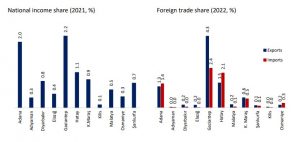
* Share impact import/export per region after earthquake If your company is interested in an individual or group trade mission to the Turkish region to explore needs together with local Chambers of Commerce and entrepreneurs, please contact the foundation.
How can we learn how to better prepare for such disasters in the future? Awareness of disaster risks should be heightened at all management levels and among employees in companies. The Chamber of Commerce foundation can direct you to experts and training programs for Disaster and Emergency Management Certification. Contact.
-
Nov 03 2023 National Export Event, Netherlands
Future-proof exporting, how do you do it? Where can you engage with exporters and managers of global embassies and consulates-general?
On November 1st, this was wonderfully facilitated during the “National Export Event” in the Netherlands. A total of 400 exporters were present. The Chamber of Commerce Netherlands-Turkiye Foundation was also, of course, part of it!
Did you miss it? Would you still like to discover opportunities in Turkiye or in the Netherlands under the personal guidance of Dutch-Turkish speaking experts? Many (satisfied) entrepreneurs have already received tailor-made assistance: your company is unique as well.
Feel free to contact us for a cup of coffee in Rotterdam (06 391 110 243). Membership is not required; we are easily accessible. Afterward, we can still establish a connection with expert partners in any region.
-
Oct 24 2023 International Chamber of Commerce / Black Sea Grain Corridor
Upon invitation from the International Chamber of Commerce, the Chamber of Commerce Netherlands-Turkiye foundation participated in the “ICC Agri-Food Hub Dialogues on Trade: Alternatives to the Black Sea Corridor for Food Security” on October 11, 2023.
The grain initiative for the Black Sea was negotiated in July 2022 among Turkiye, the UN, and Russia as a means to ensure that Ukraine, one of the world’s granaries, could facilitate the departure of its grain through its southern ports via the Bosporus. Experts during the ICC session included the Ukrainian Chamber of Commerce and Industry, the Ukrainian Grain Association, the Danube Soya Association, UNCTAD and the WTO.
Recent research data were presented, encompassing statistics and trends related to grain production and export from Ukraine, importing countries, maritime and land routes, as well as the impact of the cessation of the grain deal between Russia and Ukraine on global supply chains, transportation costs, grain, and consumer prices. The Netherlands ranks as the 5th grain (oil) importer, just below Italy and Turkiye, who procure more grain from Ukraine. Until July 2023, Ukraine was able to export 33 million tons of grain and other foodstuffs thanks to the grain initiative via the Black Sea, as stated by the Secretary-General of ICC, Mr. John Denton.
Between March 2022 and September 2023, over 51.5 million tons of grain, oilseeds, and related products left Ukraine via the Solidarity Lanes. This is an EU initiative with alternative logistical routes by rail, road, and inland waterways, enabling the export of 60% of Ukraine’s grain since the beginning of the conflict, with 40% exported via the Black Sea Grain Initiative.
30% of the agricultural land in Ukraine is infected with mines. You can help clear grain fields in Ukraine by making a donation. How? Point your smartphone’s QR reader at the QR code in the attached photo. Alternative via website.
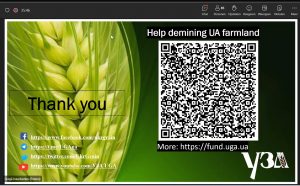
Stakeholders interested in more data can join a logistics roundtable discussion at the CCNT foundation in Rotterdam. Contact P. Wolters.
-
Apr 18 2023 Experience and view (video) Trademission Mersin, Antalya
Watch this animated video with a Dutch delegation of importers/investors. They are on their way to Mersin and Antalya to meet Turkish fresh produce producers/suppliers.
Why did delegation members decide to seek opportunities in Turkiye? What is there to observe, taste and do? Experience it yourself by watching the video (2022).
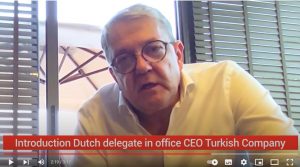
Interested in joining us in 2023? Other sectors are also welcome. Send your requirements and specifications.
-
Mar 29 2023 Meet Turkish healthcare sector, Amsterdam
The aim of the ‘Health Tourism Event’ is to create connections and networking opportunities between you (professional or citizen/consumer) and 90 participating Turkish hospitals, clinics, Dutch and Turkish medical tourism agencies, health institutions, insurance companies, doctors and investors in the health sector.
How to participate?
-
Exhibition part is free for everyone after registering.
-
B2B part is for institutions and companies that have received a private invitation from the organizers ALZ Fair & Go Fair.
Are you a health insurer (purchaser)? Join a group of the Chamber of Commerce Netherlands-Turkiye foundation (CCNT) that has already built up relationships with the Turkish organizers. Send an email with your company contact details, or call 06-391 102 43. B2B participants also have access to the conferences, the international networking cocktail reception and the event itself.
-
Location: Postillion Hotel & Convention Centre, Paul van Vlissingenstraat 9-11, Amsterdam (Google Maps).
Next step: Healthcare Delegation to Turkiye
Would you like to take a look at local (modern, new) hospitals, elderly care institutions, clinics for bariatric surgery, gastroenterology, oncology, etc. in Turkiye under the guidance of a market specialist and interpreter? Would you like to personally meet a Turkish healthcare provider? Participate in the Health Care Trade Mission that will be facilitated in the autumn by the CCNT in collaboration with a local partner in Turkiye. Send your company contact data and specifications.
The biggest gain can be made by mapping out the top clinical institutions in Turkiye and subsequently making agreements and contracts. Any obstacles regarding adequate and high-quality care is then removed because it will be arranged by contract while the offer is formally described.
‘Work to be done’ will be to establish a coherent ICT. It goes without saying that ICT systems are not set up in such a way that the information flows between NL and TR can be exchanged. This is definitely going to have to be done. However, it should be borne in mind that healthcare in Turkiye is professional and that the ICT systems can easily be compared to those in the Netherlands when it comes to the degree of professional development.
Entrepreneurial initiative: Turkish information health care center, Rotterdam
The intention of the Turkish healthcare sector is to build a permanent Turkish information care center in Rotterdam. Although the exact role, structure and services are still open to be defined, this center will undoubtedly lead to high expectations among potential customers and more ‘traffic’ between the Netherlands and Turkiye.
Turkish care for Dutch frictions
In the past, a number of cross-border care initiatives were prompted on the one hand by large waiting lists for Dutch care and also to bridge cultural differences and thus enable faster treatment. Ultimately, lower costs for the insurer.
In recent years we have seen a “dramatic” increase in waiting lists for health care. Hospitals, nursing home care, mental health care and youth care are faced with waiting times that can run up to many months. Acute care is still guaranteed. Although this is at the expense of elective care, which puts further pressure on waiting lists. The two corona years have of course had a negative impact in terms of waiting lists. Oncological care has fallen considerably behind.
Staff shortages, being less attractive as an employer, working long hours, high absenteeism due to illness and constantly lagging behind the facts do not increase job satisfaction within Dutch healthcare institutions. Absenteeism rates of more than 15% are no exception. Working in many healthcare institutions is difficult, with the result that medical specialists and general practitioners want to follow a course to become a company doctor. Currently there are already 60 doctors in training (source: board member of the Chamber of Commerce Netherlands-TürkiyeFoundation, Oude Gracht Group, Stichting Praktijkopleiding Arbo Professionals).
Insurers have a duty of (health) care towards insured persons, which is becoming increasingly difficult to fulfil. On a daily basis, Zorgklacht.nl receives calls from insured persons asking whether they can mediate towards their insurer for receiving care.
The Health and Youth Care Inspectorate (IGJ) observes that the number of clinics and agencies that will offer different types of care is still increasing. That is not always a good development. Care fraud and not always clear quality of care is not desirable. Nevertheless, it does contribute somewhat to reducing the waiting lists.
Hedging risks
In recent years, Turkiye has proven to be a reliable partner when it comes to relations with the Netherlands. Many relationships within and between entrepreneurs and governments have led to good agreements with ditto services. It therefore seems time to seriously use the care provided by Turkish healthcare providers for Dutch patients, whether they are of Turkish origin or not.
Certainly bad examples have been mentioned in the media about the care in Turkiye from time to time. This reporting is without doubt tendentious. After all, these always concern clinics where, in particular, plastic surgery, Botox, Fillers, etc. take place. This is also a sector in the Netherlands where the quality of care cannot always be followed.
Furthermore, clients or patients often take an unnecessarily high risk by (conveniently and cheaper) having several medical procedures performed during one visit to Turkiye, which can have an effect on each other. A second mistake is that people use Google to quickly search any Turkish healthcare provider. It is less risky to hire a local, Dutch-Turkish-speaking expert or intermediary who has already conducted market research. The CCNT can possibly mediate here in collaboration with local partners (Contact CCNT).
In any case, it is important to establish a professional connection between the two countries. It will then be clear that, despite the distance, care can be provided at a high level at low(er) costs.
Interested in long-term care solutions between NL and TR? Ask for a meeting with the CCNT, which has short communication lines of communication with the Turkish Embassy in The Hague and relevant sector representatives in Turkiye. Send an email with your company contact details, or call 06-391 102 43 (Ethem Emre).
-
-
Feb 28 2023 Employers VNO-NCW ‘Business Support Turkiye’ meeting, The Hague
In addition to a good heart, money and medicine (today), a plan of action to get trade going again is the next step (tomorrow). With that in mind, the Chamber of Commerce Netherlands – Turkiye foundation took part in the ‘Business support Turkiye’ meeting in The Hague organised by the Dutch employers association VNO-NCW on 22 February.
Participants included the Minister of Foreign Affairs Liesje Schreinemacher, the Turkish Minister of Trade Affairs Mehmet Muş, the Turkish Ambassador to the Netherlands Selçuk Ünal, the host and chairman of VNO-NCW Ingrid Thijssen, the chairman of Hotiad, Hikmet Gürcüoğlu and the owner of Corendon, Atilay Uslu.
A list of possible action points was shared informally in advance by the Chamber of Commerce Netherlands – Türkiye foundation to stakeholders in its network. We are pleased that a number of points were, implicitly and/or explicitly, embraced by certain speakers.
? City partnerships: currently there are only partnerships between the Netherlands and Turkiye between Alkmaar + Bergama; Amsterdam + Istanbul/Şişli & Izmit; Delft + Adapazarı/Sakarya. However, no partnership with a city in the earthquake-affected region. That is why the Chamber of Commerce foundation advocates an entrepreneurial partnership, for example with Kahramanmaras and Hatay.
⚡ Sustainable energy supply: as an example and for inspiration for others, we can mention the industrial, wooden pellet-fired boiler that was donated by a benefactor – via the Chamber of Commerce foundation – to Turkiye. Several streets or hospital complexes could supply hot water.
? Trade missions: entrepreneurs should participate in trade missions to affected sectors, industries and / or commerce. Goal: matching Dutch importers with Turkish producers. The affected city of Adana has already been visited by a Dutch trade mission facilitated by the foundation in 2021.
Disaster training was not mentioned as such by speakers during the VNO-NCW meeting. Although this already exists in Turkiye, one can ask the critical question whether another form of disaster training is needed. A new private initiative for companies has therefore been created. Ask the Chamber of Commerce foundation for more information.
“National logistics plan” was also not mentioned at the meeting, while it turned out that there is a need for smooth (aid) supply chains. For several years now, an employee of the foundation has been arguing through the UN for more attention for a logistics (research) agenda supported by market players and government.
Do you want to help your Turkish colleagues on the other side of the supply chain in the longer term with the much-needed restart of their companies in the affected region?
Do you want to consult with your trading colleagues first? Entrepreneurs can use (free of charge) the meeting facilities of the Chamber of Commerce Netherlands – Turkiye foundation in Rotterdam.
Contact
-
Nov 24 2022 Satisfied Dutch customer sharing his Turkiye experience
It feels good. A satisfied Dutch entrepreneur who shares his adventure about Turkiye. But it didn’t go automatically! To make a boyhood dream come true, a helping hand is sometimes needed in the establishment of an organisation and HR activities.
Philip Knierim, CEO of Ecotone, declares to be a real fan of Turkiye. Ecotone started in Istanbul with the production of affordable and environmentally friendly office supplies. After having tasted success, he founded a second company in Turkiye. Currently, he offers employment to young, smart IT/ICT developers who deliver good work for Dutch customers.
Despite Covid-19 and increasing inflation in Turkiye, he has managed to grow his business significantly. This thanks to a long-term, robust, sustainable growth strategy.
Philip “Developing an understanding the way of doing business in Turkiye and being professionally guided by the offices in Rotterdam (CCNT foundation) and Istanbul (Turkish Dutch Trade Consulting) have contributed to my success”.
But it’s not all roses and moonshine over the Bosphorus. Philip says that specifically managing in the Turkish corporate culture is a difficult task for which he has also engaged the aforementioned parties as an interface.
Interested in ICT development in Turkiye?
A webinar on January 25 is planned by the CCNT foundation. Agenda: nearshoring and the execution of remote projects. Contact initiator Paul Tjia (paul@gpic.nl).
Watch video (Dutch spoken)


